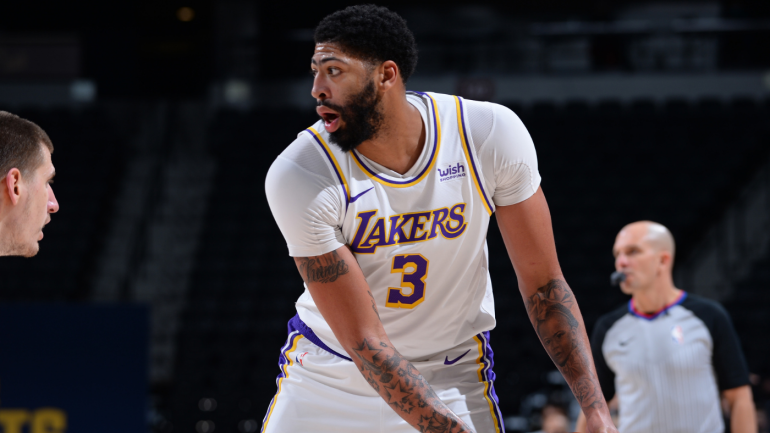
Anthony Davis is going to miss the next several weeks while he recovers from a strained calf and Achilles tendinosis, but his absence will only compound an issue that already existed for the Lakers. They're taking almost three fewer shots in the restricted area per game than they did a year ago, and opponents are shooting more than two percentage points higher there than they did last season. They've slipped a bit on the offensive glass, they're not getting to the line quite as often and they aren't blocking nearly as many shots. In short, they are, well, short. At least relative to last season, the Lakers are small and losing Davis only makes them smaller.
That's not exactly a dealbreaker for the Lakers. It's the primary benefit of having Anthony Davis in the first place. Most teams go small in the playoffs anyway, and Davis allows the Lakers to do so without sacrificing much in the way of rim protection, rebounding or interior scoring. But it's quietly become a bit of an issue in the regular season. The Oklahoma City Thunder just pushed the Lakers to overtime twice in the same week by scoring 126 points in the paint across the two games. Suffice it to say there are far better big men in the NBA than Al Horford, and several are coming up on the Lakers' schedule.
The Lakers will face Karl-Anthony Towns, Bam Adebayo and Rudy Gobert in their next five games. They'll follow that stretch with a brutal string of All-Star-caliber guards that aren't going to have any trouble getting to the basket: Stephen Curry, Damian Lillard, Devin Booker, Chris Paul and De'Aaron Fox. The Lakers have so far managed to survive without Davis. Their 4-1 record in games he's missed has helped keep them within 1.5 games of the Utah Jazz for the Western Conference's top seed.
But the schedule is about to get harder, and reclaiming the top seed is especially important this season. Home teams win roughly 80 percent of Game 7s, and the thought of playing one in Salt Lake City, even with a healthy roster and significantly more playoff experience, would be daunting under normal circumstances. Doing so in a condensed season, possibly coming off of an exhausting second-round war with the Clippers? It's less than ideal, to say the least. The regular-season won't stop without Davis, so the Lakers will be forced to try to make up ground without their superstar big man.
The problem they're going to encounter is that finding even a short-term replacement for him is going to be extremely difficult. The Lakers do technically have an empty roster spot, but at this point, they cannot legally fill it. Signing Montrezl Harrell and Wes Matthews this offseason triggered a hard cap for the Lakers at the $138.9 million apron. They entered the season so close to that line that they needed to wait until the pro-rated minimum salary went down before they could sign another player. That won't happen until Feb. 24, meaning the Lakers are still more than a week away from signing a free agent unless they waive the non-guaranteed Quinn Cook.
A trade is similarly unlikely. The hard cap concerns remain, but there is also the matching salary component of any deal that makes one difficult. The overwhelming majority of the Lakers roster is cheap. Only five players make more than $3.7 million. LeBron James is untouchable. So is Davis. The trio of Dennis Schroder, Kentavious Caldwell-Pope and Montrezl Harrell all play essential roles in the rotation. The Lakers just don't have easily moveable salary ready for a trade. Of the 14 players on their roster, 11 are active members of the rotation and not worth shunting off for a quick jolt of midseason relief. Jared Dudley is too important to the locker room to be jettisoned. That leaves Cook and Alfonzo McKinnie, who both make a pittance and have little trade value.
So what does all of this mean? Well, help could come through a free-agent signing in February, but more likely, the Lakers will bide their time and evaluate Davis' health. The trade deadline isn't until March 25, and Davis should be back on the court by then barring any setbacks. If he is, the Lakers can afford to be a bit more selective and seek out buyout targets that enhance the roster as it currently exists.
And if he isn't? Then the Lakers might need to be a bit more aggressive. Waiting until the buyout market kicks off in full in late March would mean sacrificing a month of potential minutes out of a February signing, but would likely mean the addition of a better player. Players available before the deadline are largely the ones that went unsigned in the offseason. Afterward, veterans seeking new homes and trade flotsam create a more robust market.
The Lakers are likelier to play this out patiently. That's the leeway that employing LeBron James creates. They can feel more comfortable with the idea of winning a Game 7 on the road than typical teams. They probably aren't going to feel particularly inclined to rush a move when a better one may be available afterward. That approach could reward them with a better playoff roster, but it might mean some difficult times ahead. The Lakers without Davis are one of the NBA's smaller teams. The schedule has been forgiving on the front lately. It won't be for long.


















